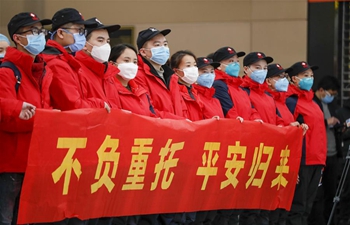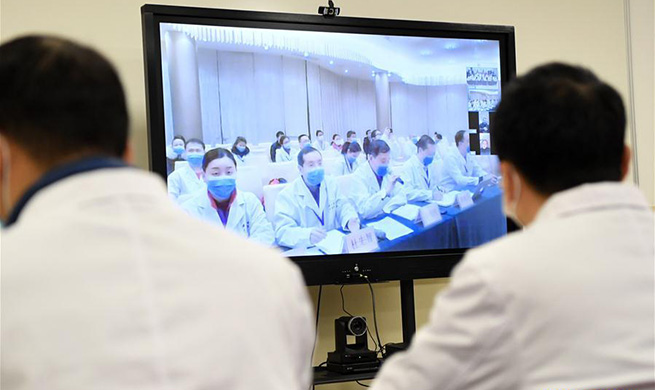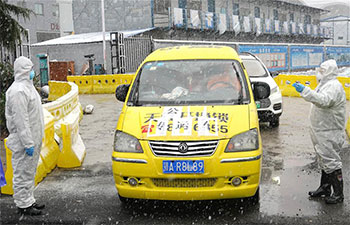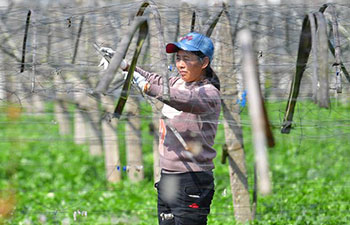MUNICH, Germany, Feb. 16 (Xinhua) -- More than 500 high-level international decision-makers gathered over the weekend in Munich to discuss the world's current crises and future security challenges at the annual Munich Security Conference (MSC).
This year's agenda was centered on the theme "Westlessness", referring to the loss of the common standing of what it means to be part of the West, according to a security report published ahead of the conference.
As many participants pointed out, the so-called "Westlessness" is essentially a lack of collective action to address the most urgent threats to international security as nations dwell on narrowly-defined national interests and retreat from dialogue and cooperation.
The MSC discussions highlight the fact that multilateralism is not out-of-date and even more needed at a time when the international community face many common security challenges.
"SOUL-SEARCHING" OF THE WEST
The majority of speakers at this year's conference sounded the alarm for the current global security environment. In his opening remarks, MSC chairman Wolfgang Ischinger expressed his disappointment at the lack of collective action to address the most violent crises and most dangerous threats to international peace and security.
"It's not enough for the most powerful people in the world to shrug your shoulders and say that this is the way things are," Ischinger said, adding that "the present state of global insecurity is absolutely unacceptable."
German President Frank-Walter Steinmeier, who delivered an opening speech this year, said that the withdrawal to concentrate on a narrowly-defined national interest prevents the nations from taking joint action and coming up with convincing answers to the issues and problems that no one can solve alone.
"The idea of international community is not outmoded," Steinmeier said, adding that "withdrawing into our national shells leads us into a dead end, into a dark age."
Like many European leaders, Steinmeier reflects on the lack of unified action on the European level to address common challenges. "Each of the major players is pursuing its own advantage even at the expense of Europe's unity."
Echoing Steinmeier, French President Emmanuel Macron, who attended the conference for the first time, called for "a European strategy", hoping to see "a Europe that can protect the basis of its sovereignty, a Europe that has more vitality, and a Europe that is enthusiastic about its future."
Macron said in a dialogue with Ischinger that Europe needs to develop their own European policy, instead of a transatlantic policy, when it comes to relations with neighbors such as the Middle East, Russia and Africa.
Gu Xuewu, professor of political science at the University of Bonn, said that discussions on "Westlessness" expose problems that currently plague the relations between the European Union and the United States.
"There is a sense of loss on the European and American influence in leading global affairs, a loss of trust, and a loss of solidarity between Europe and the United States," Gu said, noting that it is difficult for the West to formulate a unified strategy with the "America First" policy of the United States in place.
CALL FOR UPHOLDING MULTILATERALISM
For some participants, talking about "Westlessness" may seem a little self-absorbed, as it is questionable that to which degree the West and Non-West divide is still relevant these days.
Canadian Prime Minister Justin Trudeau said in a panel discussion that the core of "Westness" is the "respect for diversity." The Western model is not the only one that matters in the world.
South Korean Foreign Minister Kang Kyung-wha said she found the theme of "Westlessness" a little insular. Multilateralism is also being practiced by Asian countries, according to Kang, who cited the example of ASEAN centrality.
At the conference, the Chinese delegation renewed their call for upholding multilateralism in the face of a complex and changing international environment.
"Strengthening global governance and international coordination is urgent right now," Chinese State Councilor and Foreign Minister Wang Yi said in a speech on Saturday.
"We need to get rid of the division of the East and the West and go beyond the difference between the South and the North, in a bid to build a community with a shared future for mankind," Wang said.
He said that the novel coronavirus epidemic had made mankind realize that it is now an era with traditional and non-traditional security threats being interwoven. A regional issue can be transformed into a global one, and vice versa. No country can stay alone and be immune to the threats.
Wang further expounded the concept of multilateralism from the Chinese perspective. Multilateralism denies the priority of a single state and holds that all countries share the same right for development, he told the conference.
Meanwhile, the West should also discard its subconscious mentality of civilization supremacy, give up its bias and anxiety over China, and accept and welcome the development and revitalization of a country from the East with a system different from that of the West, said the Chinese top diplomat.
Success of multilateralism calls on major nations to play key roles and take major responsibilities. Therefore, big nations must shoulder responsibilities and safeguard the common interests of all countries, Wang also noted.
Major nations should strive to maintain the openness of the world, not to confront and counteract each other, and to join hands to safeguard world peace and stability, he added.
He said that China will further deepen the strategic partnership of coordination with Russia, continue to explore ways of peaceful coexistence and win-win cooperation with the U.S., and will comprehensively deepen cooperation with Europe.
At this year's conference, discussions on new security challenges posed by technology, climate change and global health issues underline that need for more cooperation and coordination among nations, as well as among big companies, media and other concerned parties.












